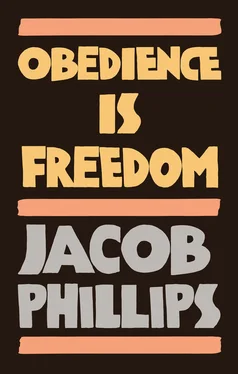1 Cover
2 Title Page Obedience is Freedom Jacob Phillips polity
3 Copyright Copyright © Jacob Phillips 2022 The right of Jacob Phillips to be identified as Author of this Work has been asserted in accordance with the UK Copyright, Designs and Patents Act 1988. First published in 2022 by Polity Press Polity Press 65 Bridge Street Cambridge CB2 1UR, UK Polity Press 101 Station Landing Suite 300 Medford, MA 02155, USA All rights reserved. Except for the quotation of short passages for the purpose of criticism and review, no part of this publication may be reproduced, stored in a retrieval system or transmitted, in any form or by any means, electronic, mechanical, photocopying, recording or otherwise, without the prior permission of the publisher. ISBN-13: 978-1-5095-4935-1 A catalogue record for this book is available from the British Library. Library of Congress Control Number: 2021949835 The publisher has used its best endeavours to ensure that the URLs for external websites referred to in this book are correct and active at the time of going to press. However, the publisher has no responsibility for the websites and can make no guarantee that a site will remain live or that the content is or will remain appropriate. Every effort has been made to trace all copyright holders, but if any have been overlooked the publisher will be pleased to include any necessary credits in any subsequent reprint or edition. For further information on Polity, visit our website: politybooks.com
4 Introduction
5 1 Allegiance Notes
6 2 Loyalty Notes
7 3 Deference Notes
8 4 Honour Notes
9 5 Obligation Notes
10 6 Respect Notes
11 7 Responsibility Notes
12 8 Discipline Notes
13 9 Duty Notes
14 10 Authority Notes
15 Index
16 End User License Agreement
1 Cover
2 Table of Contents
3 Title Page
4 Copyright
5 Introduction
6 Begin Reading
7 Index
8 End User License Agreement
1 iii
2 iv
3 1
4 2
5 3
6 4
7 5
8 6
9 7
10 8
11 9
12 10
13 11
14 12
15 13
16 14
17 15
18 16
19 17
20 18
21 19
22 20
23 21
24 22
25 23
26 24
27 25
28 26
29 27
30 28
31 29
32 30
33 31
34 32
35 33
36 34
37 35
38 36
39 37
40 38
41 39
42 40
43 41
44 42
45 43
46 44
47 45
48 46
49 47
50 48
51 49
52 50
53 51
54 52
55 53
56 54
57 55
58 56
59 57
60 58
61 59
62 60
63 61
64 62
65 63
66 64
67 65
68 66
69 67
70 68
71 69
72 70
73 71
74 72
75 73
76 74
77 75
78 76
79 77
80 78
81 79
82 80
83 81
84 82
85 83
86 84
87 85
88 86
89 87
90 88
91 89
92 90
93 91
94 92
95 93
96 94
97 95
98 96
99 97
100 98
101 99
102 100
103 101
104 102
105 103
106 104
107 105
108 106
109 107
110 108
111 109
112 110
113 111
114 112
115 113
116 114
117 115
118 116
119 117
120 118
121 119
122 120
123 121
124 122
125 123
126 124
127 125
128 126
129 127
130 128
131 129
132 130
133 131
134 132
135 133
136 134
137 135
138 136
139 137
140 138
141 139
142 140
143 141
144 142
145 143
146 144
147 145
148 146
149 147
150 148
151 149
152 150
153 151
154 152
155 153
156 154
157 155
158 156
159 157
160 158
161 159
162 160
163 161
164 162
165 171
166 172
167 173
Jacob Phillips
polity
Copyright © Jacob Phillips 2022
The right of Jacob Phillips to be identified as Author of this Work has been asserted in accordance with the UK Copyright, Designs and Patents Act 1988.
First published in 2022 by Polity Press
Polity Press
65 Bridge Street
Cambridge CB2 1UR, UK
Polity Press
101 Station Landing
Suite 300
Medford, MA 02155, USA
All rights reserved. Except for the quotation of short passages for the purpose of criticism and review, no part of this publication may be reproduced, stored in a retrieval system or transmitted, in any form or by any means, electronic, mechanical, photocopying, recording or otherwise, without the prior permission of the publisher.
ISBN-13: 978-1-5095-4935-1
A catalogue record for this book is available from the British Library.
Library of Congress Control Number: 2021949835
The publisher has used its best endeavours to ensure that the URLs for external websites referred to in this book are correct and active at the time of going to press. However, the publisher has no responsibility for the websites and can make no guarantee that a site will remain live or that the content is or will remain appropriate.
Every effort has been made to trace all copyright holders, but if any have been overlooked the publisher will be pleased to include any necessary credits in any subsequent reprint or edition.
For further information on Polity, visit our website: politybooks.com
Readers picking up a book entitled Obedience is Freedom , with chapters entitled ‘Allegiance’, ‘Loyalty’ or ‘Obligation’ and so on, may be expecting an academic treatise. Perhaps they will expect this introduction to start by listing some examples of how obedience is today considered irredeemably toxic. Then, a discussion of freedom, suggesting today’s preference for interpreting this as individual self-fulfilment often leaves people frustrated, isolated and at times even enslaved. The ground would then be prepared to state the thesis of this book: a rediscovery of obedience (and subcategories like allegiance, loyalty and obligation) promises a more enduring and genuine freedom than that offered by today’s self-fulfilment paradigm. Indeed, many great thinkers have long since argued that an avoidance of restraint serves only to intensify the degree to which we are restrained, and that genuine and enduring freedom is to be found through obediently entering into the ways personal choice is ever limited by the networks of responsibility in which we live.
Having outlined the basic position in the Introduction, such readers might expect the chapters to outline, in prosaic terms, exactly how the themes under discussion contribute to that more authentic freedom lacking in today’s world. These would then begin with comments on the etymology of the chapter heading. These terms often combine elements of restraint or obedience with expressions of spontaneity or freedom. The word obligation, for example, derives from the past-participle stem of the verb obligare , meaning ‘to bind’, and yet also from the noun obligatio , which is connected with expressing gratitude; hence the old English phrase ‘much obliged’. From findings such as these, some discussion of ancient texts would be expected, particularly those of Greek and Roman philosophy. Then a critical discussion with more contemporary voices could follow, working towards the overarching conclusion that obedience is not only connected with freedom in ways we seem to have forgotten, but that these two are so mutually dependent they are indistinct: hence, obedience is freedom.
Читать дальше










